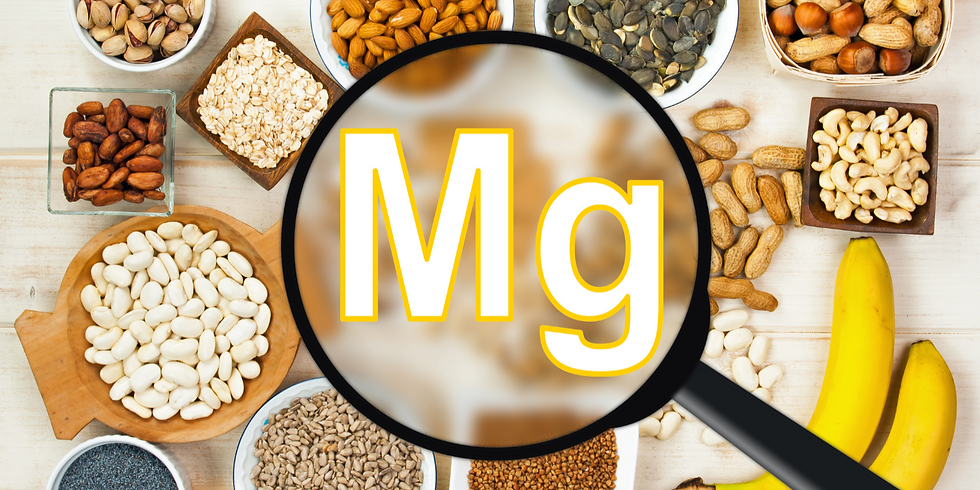5 Natural Remedies For Stress
- Katie Bailey, MS, RD, LD, FNC

- Sep 2, 2024
- 5 min read
Hi everyone. Welcome back to our channel.
Stress is an inevitable part of life, but it doesn't have to control you with the right strategies, you can manage stress effectively as well as maintain a healthy and balanced lifestyle.
So in today's video, I'll be diving into:
What is stress and what is the difference between acute and chronic stress?
How does stress affect your body and impact overall health?
What symptoms are associated with chronic stress and
What are five natural remedies that can help manage stress?
[Video Transcript Below + Supplement Links Discussed In Video]
Hi, I'm Katie Bailey. I'm a registered dietitian at Flusso Nutrients where we provide supplement education and professional quality supplement options for you to make the world of nutrition supplements a little bit easier to navigate.
As always, be sure to check with your main nutrition literate healthcare provider before starting anything new. As we can't know your full medical history to make a personalized recommendation. So without further ado, let's jump into today's topic.
What is stress and what's the difference between acute and chronic stress?
So stress is the body's natural response to challenging situations and events. It triggers a release of hormones such as cortisol and adrenaline that prepare the body to either fight or flee a perceived threat.
While this response is essential for survival, chronic or excessive stress can be detrimental to our physical and as well as our mental wellbeing.
Now, stress is not inherently bad. In fact, acute stress is actually beneficial as it motivates us to perform better or to react more quickly in emergencies. However, when stress becomes chronic, it can lead to a host of negative consequences.
So acute stress is short term and typically it resolves after the stressful situation passes.
Now, chronic stress is persistent and can last for weeks, months, and even years.
How does stress affect the body and impact our overall health?

Well, stress can affect the body in numerous ways.
When you experience stress, like I mentioned before, your body releases hormones that increase your blood pressure, your heart rate breathing, and blood sugar.
This is known as our fight or flight response.
This is going to be helpful in the short term, but if it persists for an extended period of time, it can become harmful.
Chronic stress can lead to a weakened immune system, digestive issues, headaches, muscle tension, as well as cardiovascular issues.
It can also contribute to mental health problems such as anxiety, depression, and cognitive impairment.
What symptoms are associated with chronic stress?
Some common physical symptoms that we see are headaches, chest pain, fatigue, insomnia, digestive issues such as diarrhea, constipation, or nausea, changes in appetite and weight, as well as frequent colds and infections in addition to physical symptoms, chronic stress can also manifest in psychological problems such as anxiety, depression, difficulty concentrating, memory problems, feelings of overwhelm and low self-esteem.
Now that we've reviewed stress in general, let's jump into what are five natural remedies that can help manage stress.
Natural remedies for stress: Magnesium
The first one I want to talk about is magnesium.
Magnesium is an essential mineral that is involved in over 300 biochemical reactions in the body and can help reduce stress, anxiety and improve sleep.
Magnesium glycinate in particular, is a form that has a lot of research supporting its use for stress purposes. It helps to relax and relax our nerves and our muscles, which is going to reduce that feeling of stress.
You can either incorporate more magnesium rich foods like nuts, seeds, dark chocolate, and avocados, but unfortunately our food supply has been quite depleted in magnesium, so you can also choose to supplement it with it as well.
Natural remedies for stress: Ashwagandha
The second one I want to talk about is ashwagandha.
Ashwagandha is an adaptogenic herb, which is going to help the body to adapt and cope with stress better.
It's also going to promote a sense of calm. So adaptions help to support the adrenal glands, which are stress hormones are produced and released, and this can be supplemented in for. You can also find it as a pill or a tincture.
And research has shown that specifically ashwagandha can help to decrease stress, enhance your mood, and decrease cortisol levels.
Natural remedies for stress: Rhodiola
The third one I want to talk about is rhodiola, which is also another adaptogenic herb. It's going to help to regulate our stress response as well as improve cognitive function. It specifically is going to help support our sympathetic nervous system.
Just to caution with rhodiola is if you already have problems with blood pressure or if you are on blood pressure medication, it does decrease your blood pressure. So just speak to a healthcare professional if you're considering trying rhodiola.
Natural remedies for stress: L-Theanine
The fourth supplement that you could try or remedy that you could try is l-theanine.
So l-theanine is an amino acid that's found in green tea that can promote relaxation without causing drowsiness, and you can choose to increase your green tea consumption, or you can actually supplement with l-theanine itself.
Natural remedies for stress: Omega 3s
And then the fifth remedy is omega 3's.
So omega 3's, there's a lot of research that has shown that it can help to decrease our cortisol levels, inflammation, as well as improve mood regulation.
You can increase omega 3's by increasing your fatty fish consumption, walnuts and flaxseed, or you can just choose to supplement with omega threes too.
And just a reminder that before starting any new supplement, be sure to check with your healthcare professional to ensure that it's the right fit for you, as well as it's not going to interact with any other medication or supplement that you're currently taking.
Natural remedies for stress: Lifestyle + In General
When dealing with stress, it's important to prioritize a diet that's going to provide the necessary nutrients to optimize brain function as well as stress resilience.
This is going to be a whole foods nutrient dense diet that's full of a variety of fruits and vegetables, whole grains, lean proteins, and healthy fats.
Lifestyle changes like getting regular exercise in practicing mindfulness or meditation, deep breathing and getting adequate sleep is also going to be very beneficial in helping you to manage your stress levels.
Wrap-Up
To wrap up our topic for today, although stress is a natural part of life, it's important to ensure that our acute stress does not develop into chronic stress by incorporating natural remedies like eating a balanced diet, having targeted supplements like omega threes, magnesium adaptogenic herbs, and l-theanine, as well as regular exercise, adequate sleep and mindfulness, you can effectively manage stress and promote overall wellbeing.
So that's it for today's topic. If you like this video, please hit the like button and subscribe for more nutrition videos.
Let us know in the comments if you've used any of these remedies for stress or if you have any questions.
If you're interested in working with our clinic, you can click link here to schedule an appointment.
We do take insurance. You can find more information about that on our website.
Thanks for watching. I'll see you next time. Bye.
Check out the high-quality supplements we discussed in this video - links below for your convenience!
1) L-Theanine: https://flussonutrients.nutridyn.com/l-theanine-pro
2) Magnesium: https://flussonutrients.nutridyn.com/magnesium-glycinate
3) Stress Supplements: https://flussonutrients.nutridyn.com/stress-essentials-balance-seb + https://flussonutrients.nutridyn.com/cortisol-pro
4) Fish Oil Omega 3: https://flussonutrients.nutridyn.com/omega-pure-epa-dha-600
5) ALL PROFESSIONAL QUALITY SUPPLEMENTS: https://flussonutrients.nutridyn.com & https://us.fullscript.com/welcome/flussonutrients




Comments